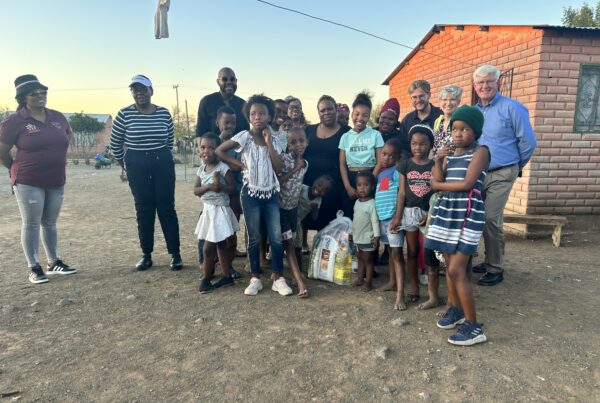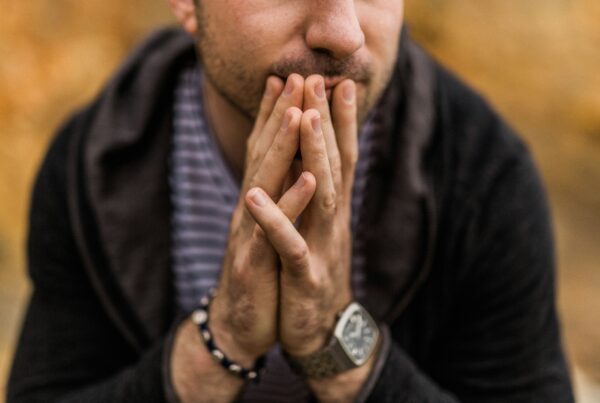In this Q&A, certified spiritual director Jill Sweet talks about her role as a spiritual director, finding hope amid hopelessness, and taking care of yourself so you can take care of others. This conversation has been edited for length and clarity. Listen to the full conversation with Jill via the Re:Forming Podcast, hosted by Ruth Langkamp and Anna Radcliffe. The podcast is a space for connection and a place where hosts, guests, and listeners unpack some of the greatest issues the Christian community faces today.
Anna: Let’s start with an introduction to spiritual direction, which is a new idea for many people. What does it mean that you’re a spiritual director? What is spiritual direction, and how did you get involved?
Jill: It’s what I have been doing since 2013. I have the privilege of doing spiritual direction—sitting with people in real time and helping them discern what God is doing in their lives.
It was really part of my overall discernment of what was next in my life. After my kids went to college, I just spent a year asking God, what is next for me? And I ended up in seminary and doing distance learning. The cohort above me had some spiritual directors, and they said, “You know, Jill, you’d make a great spiritual director.” I was kind of aware of that, but not fully. So that was really the first nudge toward it.
And then in seminary, when things got a little bit academic and dry, I found my way into group spiritual direction and then into a certificate training program to be a spiritual director, which I just thrived in. It was so nice to have come out of that discernment process knowing what I love to do. After I graduated from seminary, I was able to then start my practice as a spiritual director.
Related: What is spiritual direction, and how can it help you in your faith?
Anna: Spiritual direction isn’t results-oriented, but are you able to share a story of a breakthrough you’ve seen someone have?
Jill: With spiritual direction, my focus is on the spiritual life: what is God doing in your life? How are you praying? What are your spiritual practices? What are the stirrings of your soul? How’s your heart reacting? I had a directee who I was working with for several years, and we did a lot of work around trusting God and discerning call. And then we really hit a wall. We hit some resistance. When we come to resistance, it’s often somewhere we need to go, even though we don’t want to, because that’s where God is at. As the director, I paid attention to that for several months and thought that there was some emotional work that might be helpful. So, finally, after the third month that had come up, I said, “Do you think maybe some therapy would be good around this?” And she said, “Yes, I was thinking the same thing.” And so she found a therapist and started doing some work with the therapist. Spiritual direction and the therapy together really helped her move forward, both emotionally and spiritually.
I say that also as a way of saying that what I focus on and what a therapist focuses on are very different. My focus is on your walk with the Lord and what spiritual practices might help someone move forward, whereas a therapist will give tools, perhaps around ways of avoiding and getting through anxiety. So, spiritual direction is not therapy. It’s not counseling, mentoring, or coaching. And yet those are all aspects of it at times, depending on what a person might bring to the table or what someone needs work on.
Ruth: During the COVID-19 pandemic and through all its challenges, how have you seen people’s spiritual lives affected?
Jill: I’ve just noticed a sense of hopelessness come over all ages. I see people in their seventies, all the way down to 17. Just across the board, there’s some hopelessness. And I would define that in terms of the spiritual realm, actually. I’ll use the acronym H-O-P-E. There’s a decreased sense of capacity to honor God. There’s less of an opening up to God and a little bit less praising and praying to God. And expectation—I’ve noticed a lost expectation that God is going to do more, or even that God’s going to do exceedingly more than what we can ask or imagine.
So it certainly is, “Where is God?” but I just think there is this loss of hope.
Anna: What encouragement do you have for those who are feeling hopeless? How do you move forward into hopefulness?
Jill: Early on in the pandemic, the thing that I suggested that people do actually came out of my own experience in therapy and in terms of having something to look forward to in real time. Things are shut down; what are we going to do? I just encouraged people to put something on your calendar that you can look forward to, perhaps a phone call, a Zoom meeting, some connection or something that you can look forward to. That continues to be true, and that was a trick that I’ve learned in my own walk and keeping some rhythms. What is it that you can put on your calendar that you can look forward to?
And then, spiritually and prayerfully, you can do a prayer of examen. At some point in your day, maybe in the evening, you review your day and think about when you were the most hopeful and when you were the least hopeful. And so you’re reflecting on that. And then you can carry that into the next day or the next week, asking, “Lord, what adjustments do I need to make in my level of hope?” Or, you can say, “When was I most anxious today? And when was I least anxious today? What was I thinking about in those moments?” So that’s kind of a spiritual prayer that you can do.
Lastly, what can you do physically? We’re spiritual, we’re emotional, we’re physical beings. So think about what you can do physically to keep yourself hopeful and less anxious. Prayer is both a spiritual and physical thing. Think about a word when the anxiety or hopelessness starts to take over, and just notice your breathing. Is there a word that you can repeat?
Let me share an example. I have twin granddaughters and they’re six years old. And they came here this summer for a short visit. We went to a cabin, and they were away from mommy and daddy, and it was a strange and different place. I could tell they were anxious, and we were getting them to articulate their anxiety. It was time for bed and they were both like, “I’m kind of anxious, Grammy. I don’t feel real good right now.” And I said, “I know, girls. I’m kind of feeling that, too. Let’s just do the next familiar thing. What’s the next thing we can do that’s familiar?” And I said, “How about we brush our teeth?”
So, that is something that I have been doing more, even in my own life, just asking, what’s the next familiar thing that I can do? Anxiety can just take over, so in those moments when I am distracted and overwhelmed: what’s the next thing that I can do that just grounds me in my body and brings me back?
Ruth: In the middle of anxiety and chaos, we need to be able to pay attention to the internal workings of our minds and our bodies. How do you define self-care, and what spiritual practices help you practice that well?
Jill: The first thing that comes to mind for me as I define self-care—and this has evolved—but really, it’s showing up for me. It’s beyond just “I’m going to go get a pedicure or a manicure.” It’s more like, how do I show up for me? It’s the most helpful, practical way that I can in that moment pay attention and notice what’s going on. And it does take a lot of intention. It takes a lot of self-awareness. Self-care, I think, requires a lot of self-awareness and then showing up, like I said, for me. Showing up for ourselves takes courage.
For example, there was a short time, maybe two weeks, during which I did four funerals. I was really just exhausted. I was spiritually, emotionally, and physically just done. I took a nap and really slept in one morning. And when I was in the midst of doing that, I thought, well, that was good self-care. But then my husband and I had to be somewhere for my father-in-law’s birthday. We didn’t have a card and we needed one more little thing for his gift. So we stopped at CVS. Normally, I worry about the coupons and getting the right thing and start micromanaging, all of that. I usually do that, not my husband. I never send him into the store, but, in that moment, what self-care became for me was letting go and giving over control of what happened. And I sat in the car and just breathed and thought, it really doesn’t matter what he comes out with. It will all be okay. For me, in real time, that was self-care. And it started with paying attention to how exhausted I really was, and in that moment, I showed up for me.
Anna: You mentioned that it takes courage to show up for ourselves. When you unpack some of that control and discover what self-care looks like in the moment, what’s the fear that’s present there for you? And how do you then connect with what the best thing is for you?
Jill: I think it takes the courage to face our fears. And I’ve been reminded that our fears are also attached to what we love because we’re afraid to lose it. When we’re afraid to lose something, we can respond with anger and shame and more fear, and then we’re not capable of really showing up for ourselves. And if we can’t show up for ourselves, we can’t show up for others. So there’s this connection between self-care and caring for ourselves in such a way that we care for others.
We all have to define what that fear is for us. That can be somewhat different at different times, but it’s often just tied also to the approval of others. So, if you’re thinking about whether something will be the best gift for someone, the fear comes through in those questions of “how will I look?” Sometimes there’s shame if you don’t do something just so, and you’re thinking, “How does that reflect on me?”
The goal of any spiritual discipline that we do is freedom. And so fear keeps us from true freedom. And sometimes I think we are robbing other people of their freedom to truly express who they are. For instance, my husband went into the CVS and got something totally different than I would have for his dad. If I had gone in and controlled it, there would’ve been a different outcome. So, is my outcome the best, or does it create freedom and space for more people?
Anna: When we do our own work and care for our own selves, we are actually empowering the people around us. What one piece of advice do you have for leaders looking to improve their self-care?
Jill: Well, you probably can guess my answer, but I just think everyone in ministry needs a spiritual director because it is a spiritual practice. Once a month, it’s saying, “I’m going to check in with my soul. I’m going to practice self-care so that I’m leading in a healthy way that creates freedom for myself and a culture of freedom within the organization that I’m leading.”
Ruth: As someone thinks about pursuing spiritual direction, how might they open themselves up to this experience of someone else being in their spiritual life with them?
Jill: I think it takes courage. It’s facing the fear of “What if I let someone else in? What will they think of me?” What I notice in spiritual direction is when the directee is hiding—the soul is the shy self—I often start asking questions that maybe will help them identify some shame that they’re experiencing their lives.
Spiritual direction is part of that self-care and then gaining that freedom. Spiritual directors say that we are teaching people that have never been in direction. So there is a learning curve to this. There’s a learning curve as you develop this rhythm and ask yourself, “What am I paying attention to all month long in order to get here?” And so, oftentimes, we will encourage spiritual practices that will help. The spiritual director will help you with this rhythm of paying attention so that it becomes easy.
Find a spiritual practice
From Scripture reading to small groups, from silence to spending time in creation, there are a great variety of spiritual practices, and many different ways to practice them. All of them help point us to Jesus.

Jill Sweet
Jill Sweet received her MDiv from Western Theological Seminary and her DMin from Fuller Theological Seminary in spiritual direction. She oversees Come Learn Rest Ministries, which provides soul care for ministry leaders and supervision for fellow spiritual directors. She is passionate about spiritual direction and sharing sacred moments with others. When she is not at home in Oakdale, California, she gravitates toward the stillness of the Bridger Tetons in Wyoming.

Rev. Annalise Radcliffe
Annalise Radcliffe is director of future church innovation for the Reformed Church in America. She is passionate about intergenerational ministry and believes that youth ministry is the work of the whole church, not just the youth pastor. She and her husband, Ron, are planting pastors of City Chapel in Grand Rapids, Michigan. You can connect with Anna by email at aradcliffe@rca.org.

Ruth Langkamp
Ruth Langkamp serves the Reformed Church in America as next generation program specialist. You can connect with Ruth at rlangkamp@rca.org.



